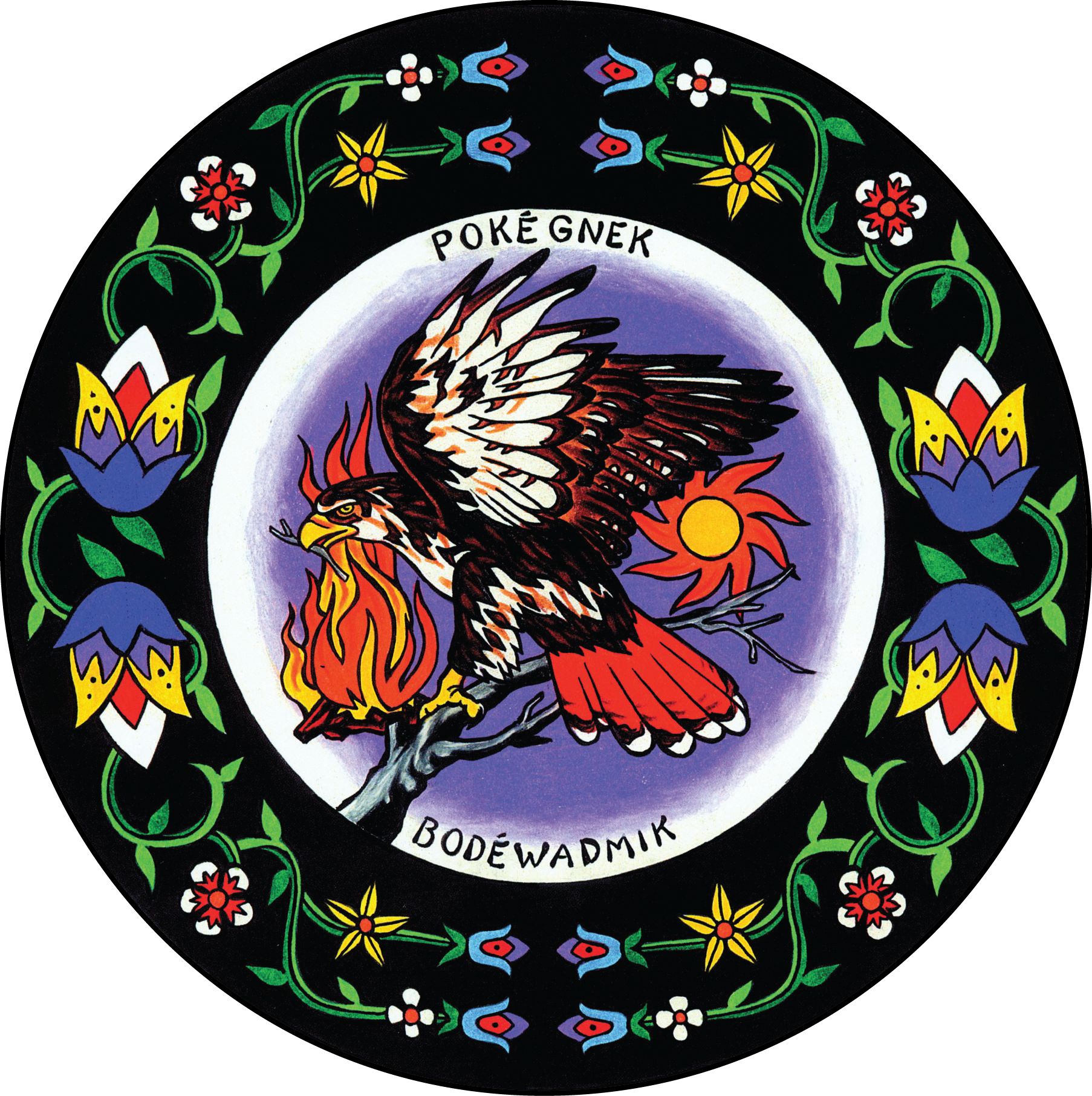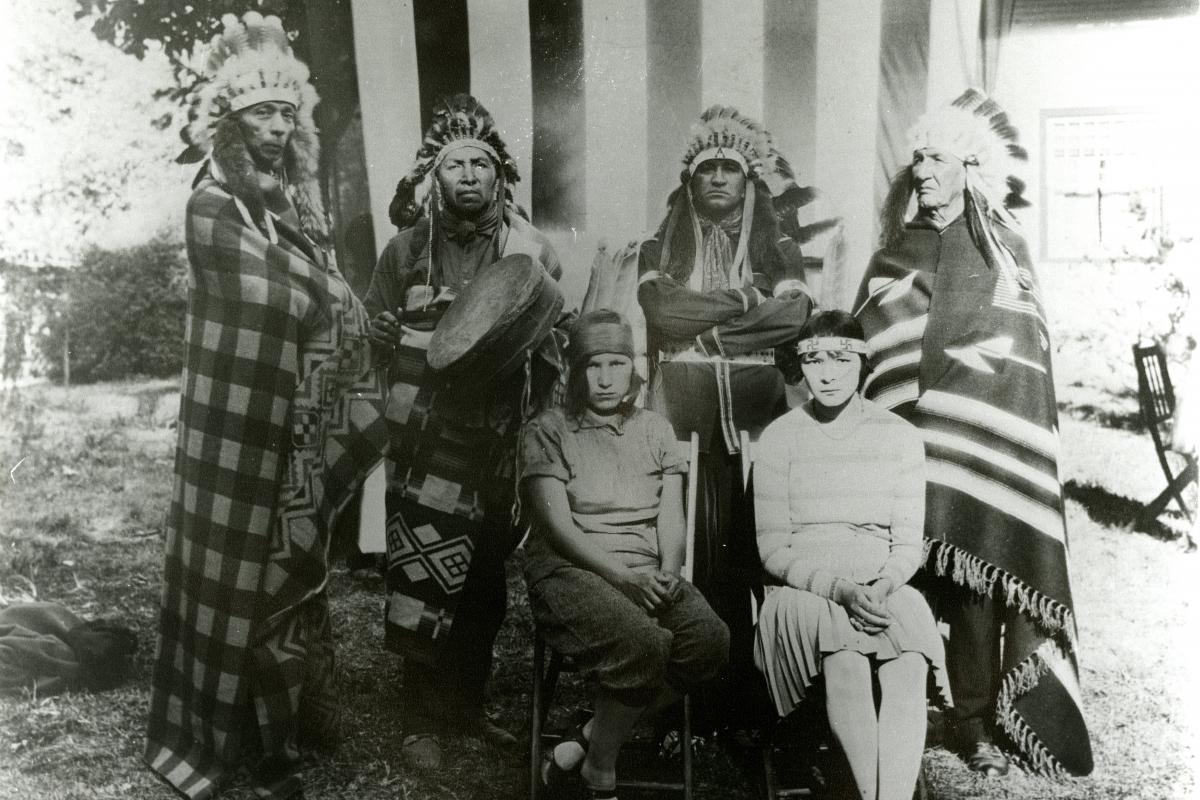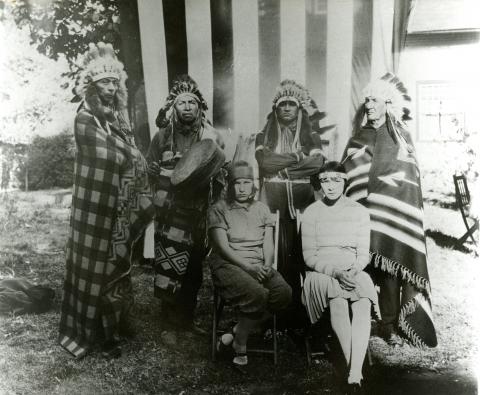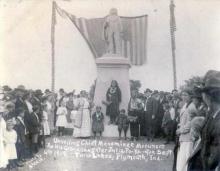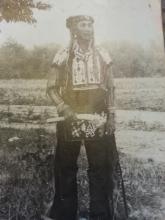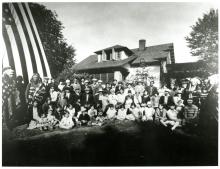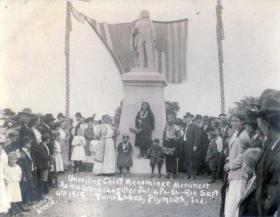Group photo of 1929 tribal election
Provided by Kyle Malott:
Back left to right: Michael B. Williams, Michael Quigno, Law Man In, Andrew Rapp
Front left to right: wife of Law-Man In, Julia Winchester
Chief Andrew Rapp
BIRTH Feb 1862
Michigan, USA
DEATH 16 May 1938 (aged 76)
Hartford, Van Buren County, Michigan, USA
BURIAL Rush Lake Indian Cemetery
Hartford, Van Buren County, Michigan, USA
MEMORIAL ID 73139805 · View Source
The Hartford Day Spring, October 16, 1929
RAPP IS CHIEF OF POKAGON INDIAN BAND
HARTFORD MAN ELECTED AS TRIBAL HEAD AT POW-WOW SATURDAY
SEEK MONEY FOR TRIBE
Organize to Recover Funds From "Great White Father," and Give
Indian War Dance
Andrew Rapp, residing northwest of Hartford and one of the most
aggressive members of the remnant of the once strong Pokagon
band of Indians, was elected chief of the band at the pow-wow held
at the Hartford town hall last Saturday.
About a hundred Indians from Michigan and Indiana attended. The
men did the voting and gave Chief Rapp 23 votes, as against 12 for
Michael Quigno of Hartford and 8 for Michael Williams of Dowagiac.
They also elected Henry Alexis of Toquin as secretary and Michael
Quigno as treasurer. Five members of the band were chosen to act
with the officers as a business committee.
The purpose of the general counsel was to formulate plans for
taking part in the effort sponsored by Chief Law-Man-la, a wealthy
Sioux Indian from Oklahoma who has established headquarters at
Niles, to collect funds that various Indian tribes claim are due under
old treaties.
All business of the pow-wow was conducted in the Pottawotomie
language. Chief Rapp, who is a grandson of the famous
Photo added by Dennis Burlingham
Potawattomie chief Leopold Pokagon, addressed his tribesman in
their native tongue and explained the age old treaties upon which
the redman base their claims to compensation from the
government.
One basis for the claim is said to be a treaty provision for annual
payments to the Indians "forever." Although they have been battling
for recognition of their claims for years, the redman are now
inspired to new hope by the activities of Chief Law-Man-In.
The Pottawotamies voted to pay their tribal officers one per cent of
all moneys collected as compensation for their services.
In the evening the Indians staged a war dance for the entertainment
of the paleface friends. Indian costumes typical of the Sioux tribe
were brought here for the occasino by Chief Law-Man-In, and
different somewhat from the Pottawotamie tribal regalia with which
Michigan palefaces are familiar.
Following the war dance Chief Rapp and Wm. Mix brought out their
fiddles and played for a dance in which a number of paleface friends
danced with the native sons and daughters of the forest.
Saturday's general council was the largest held in Hartford in years.
Before the session ended an old tribal custom was changed and
Chief Rapp was made the presiding officer at all gatherings of the
tribe. A name for the organization was also adopted. It is "The
Michigan, Indiana, Ottawa, Chippewa and Pottawotomie
Corporation Society," intended to include the remnants of all the
tribes in the two states.
______________________________
LOCAL INDIAN CHIEF IS FOUND DEAD IN WOODS
Andrew Rapp, 73, Died As He Trudged Along Woodland Trail Near
His Home
Andrew Rapp, 73, Hartford's most widely known Indian and former
chief of the Pokagon band of Pottawattomies here, was found dead
in the woods late Monday on the Charles Drullinger farm, formerly
the J. P. Hoover place, three miles northwest of town, where he is
believed to have lain since his disappearance late Friday afternoon.
Pat Alexis, a nephew of the dead man, discovered the body as he
walked to Hartford along a path through the woods and swamp
which the Indians followed as a short cut to this village from Chief
Rapp's home in the forest north of the Paw Paw river and east of the
county line.
Alexis notified local officers, and Coroner Frank Thompson and state
police from the Paw Paw post were called to the scene. Coroner
Thompson decided that death was due to a heart attack as the aged
Indian trudged toward his home, and no inquest was held. The body
was brought to the Zuver & Calvin mortuary here.
Chief Rapp came to Hartford Friday and obtained his old age
assistance check. He cashed the check and paid two small bills, at
local stores. He apparently spent the balance of the money for none
was found on his body.
Henry Alexis, another nephew, was living with Chief Rapp in his
woodland cottage. The cottage of his brother, Pat, is nearby. When
Chief Rapp failed to return Friday night, the Alexis brothers thought
little of it. Mr. Rapp frequently went to the home of Julius Becker
near Paw Paw lake and remained for a few days, and he was thought
to have gone there. Not until the nephew discovered the body lying
a few feet from the woodland path was it suspicioned that harm had
befallen him.
Mr. Rapp was nearly a lifelong resident of the Hartford community,
having lived for many years on the 20-acre tract that was his home,
most of that being covered with the native forest he loved so well.
His wife died about 50 years ago, soon after their marriage, and he
had since lived alone save when his nephews or other of his
tribesmen stayed with him.
Chief Rapp was exceptionally well versed in Indian lore and was a
most interesting narrator of the history of the redmen. In his
possession were many rare treaty books and he knew the tribal
records of his race in which his people gradually ceded their lands to
the white man. Mr. Rapp was a carpenter and was known as an
industrious workman among his white neighbors by whom he was
often employed.
Mr. Rapp was elected chief of the local Indian band in 1929, and was
the last to hold that title. As such he conducted the tribal
negotiations with the government. He was a descendant of Chief
Leopold Pokagon and his son, Chief Simon Pokagon, who came
from a long line of tribal chieftans of early days.
Chief Rapp is survived by a brother, Anthony Rapp, residing in the
Silver Creek Indian settlement in Cass county, his two nephews in
Hartford and a nephew residing in Traverse City.
Funeral rites for him were held at 9 o'clock this morning at the
Watervliet Catholic church, the Rev. Fr. J. F. Murphy officiating, and
burial was in the Rush Lake Indian burying ground - a cherished spot
to the Indians as the last residing place of Chief Simon Pokagon and
hundreds of other members of their fast diminishing race.
